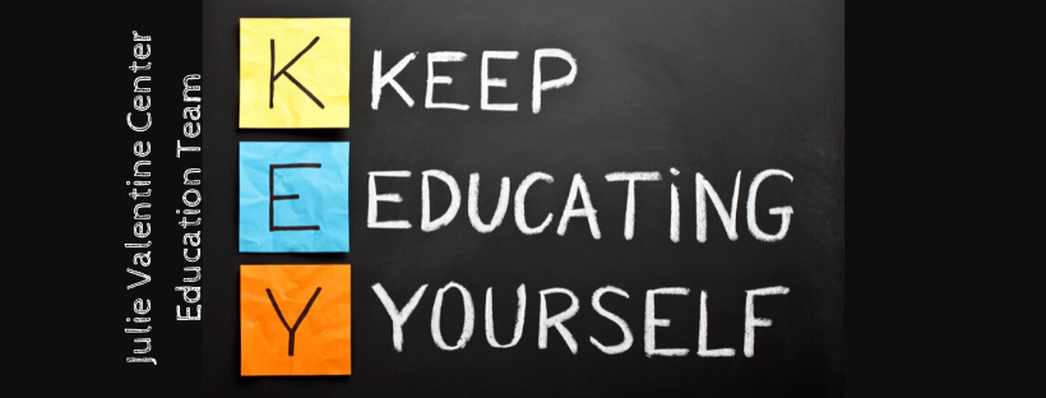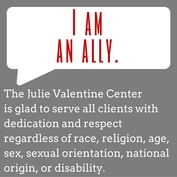Julie Valentine Center’s mission is to end sexual violence and child abuse.
This page is currently being updated. If you have any questions about our education programs, please Contact Alexa Harper, Education Coordinator
[email protected], 864-331-0560 x 229
[email protected], 864-331-0560 x 229
Educating children, parents, education partners, and local community members is essential for a community free of child abuse and sexual violence. Both adults and youth need to learn about the risks of sexual violence and child abuse in order to recognize it when it occurs, prevent it from happening, respond to it in a proactive way, and access available sources of support.
The Julie Valentine Center offers training programs, information, and resources for students and adults. Any of our programs can be customized to meet the needs of your audience and are offered in several formats. If you would like more information about any of our programs or would like to schedule a program for your group, please contact one of our education coordinator.
The Julie Valentine Center offers training programs, information, and resources for students and adults. Any of our programs can be customized to meet the needs of your audience and are offered in several formats. If you would like more information about any of our programs or would like to schedule a program for your group, please contact one of our education coordinator.
Community and Parent Education
The Bar Code Project
Drug facilitated sexual assault (DFSA) is when drugs or alcohol are used to compromise an individual’s ability to consent to sexual activity. In addition, drugs and alcohol are often used in order to minimize the resistance and memory of the victim of a sexual assault. The Bar Code Project promotes an environment of safety in local bars, restaurants, and establishments selling alcohol; Informs bar staff and patrons about DFSA, date rape drugs and local statistics, creates dialogue around alcohol impairment and sexual assault. This program creates safety plans in the event someone is drugged or overly intoxicated and therefore more susceptible to sexual assault, promotes bystander intervention from bar staff, and encourages community collaboration and accountability.
Drug facilitated sexual assault (DFSA) is when drugs or alcohol are used to compromise an individual’s ability to consent to sexual activity. In addition, drugs and alcohol are often used in order to minimize the resistance and memory of the victim of a sexual assault. The Bar Code Project promotes an environment of safety in local bars, restaurants, and establishments selling alcohol; Informs bar staff and patrons about DFSA, date rape drugs and local statistics, creates dialogue around alcohol impairment and sexual assault. This program creates safety plans in the event someone is drugged or overly intoxicated and therefore more susceptible to sexual assault, promotes bystander intervention from bar staff, and encourages community collaboration and accountability.
Agency Overview
General information about services JVC provides to the community
Mandated Reporting
Presentation that identifies the signs of child abuse and the proper procedure for reporting abuse for professionals. CEU credits are available upon request
Professional Training for Staff
JVC provides trainings for professionals and community partners. CEU and VSP credits are available upon request.
Child Abuse and Childhood Sexual Abuse Overview
Recognizing abuse, identifying child lures, prevention, and risk reduction. Perfect for PTA lunch and learns, professional staff, and any youth organization or school. Presentation format can be one or both topics. CEU credits are available upon request.
General information about services JVC provides to the community
Mandated Reporting
Presentation that identifies the signs of child abuse and the proper procedure for reporting abuse for professionals. CEU credits are available upon request
Professional Training for Staff
JVC provides trainings for professionals and community partners. CEU and VSP credits are available upon request.
Child Abuse and Childhood Sexual Abuse Overview
Recognizing abuse, identifying child lures, prevention, and risk reduction. Perfect for PTA lunch and learns, professional staff, and any youth organization or school. Presentation format can be one or both topics. CEU credits are available upon request.
eLearning and Online Support:
Online Crisis Hotline
Starting in July 2020, JVC will offer an online crisis hotline. This hotline is available to anyone, students included. As soon as it is open and available, we will share it in hopes that we can make it available and easily accessible to all students and professionals. JVC will have a link and a button available for any group to add to their webpage.
Starting in July 2020, JVC will offer an online crisis hotline. This hotline is available to anyone, students included. As soon as it is open and available, we will share it in hopes that we can make it available and easily accessible to all students and professionals. JVC will have a link and a button available for any group to add to their webpage.



